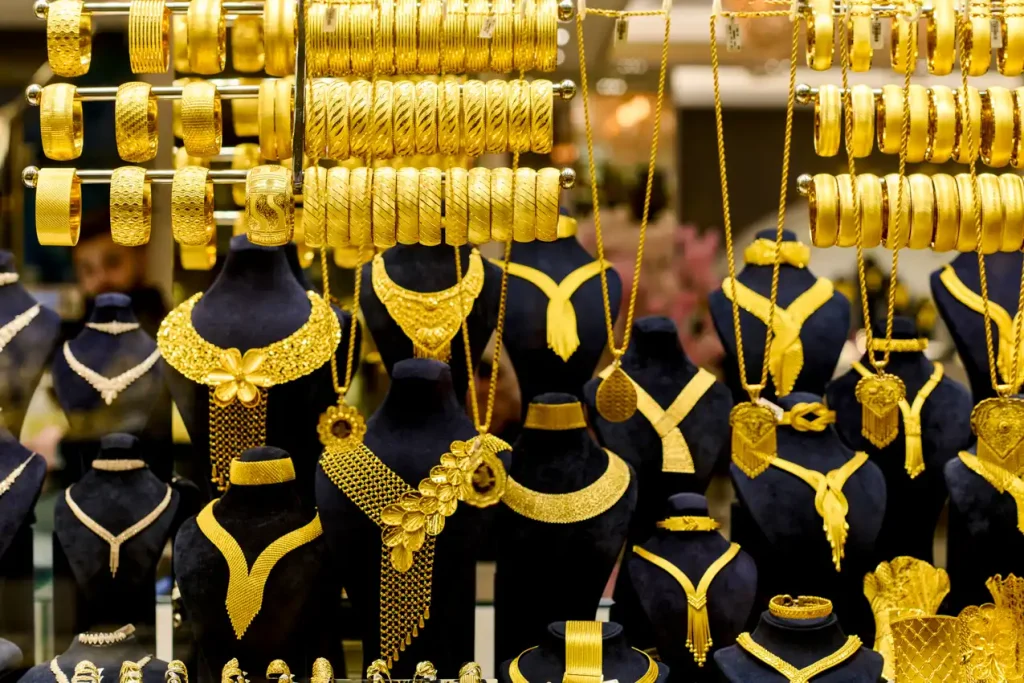Stepping into Deira’s Gold Souq feels like entering Aladdin’s cave, with shop windows glittering with 22K bangles and intricate 18K designs. What many miss is that prices here are tied to the Dubai Gold and Jewellery Group’s daily rate, which updates at 11 AM GST. Unlike fixed-price malls, haggling is expected—vendors often quote 10-25% above the market rate, assuming buyers will negotiate down. Pro tip: Visit multiple stores and casually mention competitors’ quotes to spark price drops.
Tax-Free Advantage: More Than Just a Myth
Dubai’s zero VAT policy on gold jewelry (for items over 18K) creates genuine savings compared to taxed markets like Europe or India. However, “making charges”—labor fees—can eat into this benefit if unchecked. A 22K necklace might have 8-12% making charges at Joyalukkas in BurJuman, while smaller souq vendors may charge 3-7%. Insider trick: Ask for “bare cost” pricing, separating gold weight costs from craftsmanship fees.
Purity Standards: The DMCC Guarantee
Every item sold in Dubai must carry a Dubai Central Laboratory hallmark, ensuring purity matches the claimed karat. The Dubai Multi Commodities Centre (DMCC) enforces this rigorously, with fines up to AED 50,000 for violations. Despite this, always check for the triangular Emirates purity stamp. Did you know? Dubai’s 24K gold is typically 99.9% pure, while Indian markets often sell 99.5% as “24K.”
Festival Frenzy: When Prices Actually Drop
Contrary to assumptions, Dubai Shopping Festival (January-February) doesn’t always offer the best rates—dealers inflate prices anticipating tourist demand. Real bargains emerge during summer (June-August), when local demand dips. Stores like Damiani in Dubai Mall quietly offer 15-20% discounts on designer pieces during Ramadan, paired with complimentary cleaning services.
Gold Bars vs. Jewelry: The Investor’s Dilemma
While jewelry dazzles, investors eye Emirates Gold’s refinery-certified bars. These 24K bars have lower premiums (1-3% over global rates) compared to jewelry’s 10-15% markups. Storage matters: Banks like Emirates NBD offer safe deposit boxes, but non-residents face restrictions. Surprising fact: Bars under 50 grams avoid mandatory Dubai Good Delivery accreditation, simplifying purchases.
Cultural Hacks: Mastering the Art of Negotiation
Emirati vendors respect informed buyers. Start negotiations with “Kam da’am?” (How much discount?) and walk away if prices stall—you’ll often get called back. Avoid Fridays, when weekend crowds reduce bargaining leverage. For high-value purchases, request a DMCC Certificate detailing weight, purity, and origin. The www.few.ae editorial team recommends practicing at Naif Market’s silver stalls before tackling gold.
Hidden Costs: The Fine Print That Glitters
“Free” resizing and repairs often come with conditions—a chain repaired at Malabar Gold may incur fees if the break results from wear. Insurance is another sneaky cost: Insuring a AED 20,000 necklace through Oman Insurance adds 1-2% annually. Always confirm return policies; some souq vendors only offer exchange credits.

Dubai’s Gold Price Mechanism: Beyond Global Rates
While international rates set the baseline, local demand shifts prices. During Indian wedding seasons (October-December), 22K prices rise 2-3% due to NRIs buying in bulk. Track real-time rates via the Dubai Gold and Jewellery Group app, which includes live comparisons of Gold Souq vs. Mall of the Emirates averages.
Customs Considerations: Avoiding Duty Disasters
Tourists can export unlimited gold, but home countries may impose duties. Indians face 12.5% tax on jewelry exceeding 100 grams, while Australians enjoy duty-free limits up to AUD 900. Smart move: Carry original receipts and DMCC certificates to prove purchase value.
Future Trends: Digital Gold and Blockchain
Dubai’s fintech scene is reshaping gold buying. Platforms like Ekarat by Kaloti Group allow fractional gold investments via apps, while Dubai CommerCity pilots NFT-linked gold certificates. These innovations promise transparency but lack the tactile joy of holding a minted bar.
Your Gold-Buying Checklist
- Check DMCC’s daily rate before negotiating.
- Verify hallmarks under bright light—some fakes use laser-engraved stamps.
- Use credit cards for buyer protection, despite vendor cash discounts.
- For large purchases, hire an independent assayer (AED 150-300).
- Explore wholesale markets like Dubai Gold Park for bulk discounts.
The www.few.ae editorial team confirms that Dubai remains a gold buyer’s paradise—if you navigate its glittering maze with local wisdom. From souq veterans who’ve traded since the 1960s to AI-driven price trackers, the emirate offers layers of value waiting to be unearthed. Ready to strike gold?
